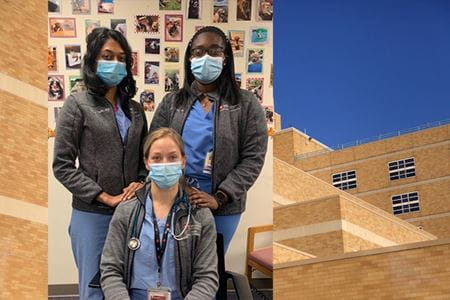“COVID has taught us to be flexible,” she said.
For the last two years, COVID has altered graduate medical education—sometimes forcing virtual patient interactions and other times demanding “all hands on deck” in hospitals, including newly minted doctors.
Nearly 40 percent of IU’s family medicine residents have been redeployed to COVID units at IU Health Methodist Hospital since the end of December, when case numbers began to surge from the omicron variant.
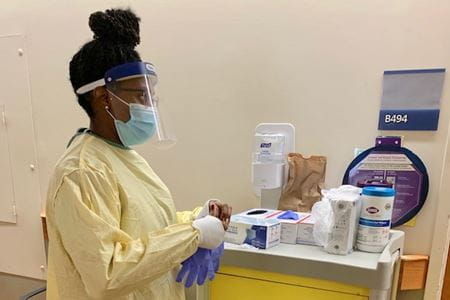 “I give a lot of credit to our residents—they roll with the punches,” said Brock McMillen, MD, the IU-Methodist Family Medicine program director. “Residency is hard enough, but when you get ‘voluntold’ you’re upending your current rotation and working 12-to-16 hour days, and you can still have a smile on your face, that lets me know we’re selecting good individuals to come into our program.”
“I give a lot of credit to our residents—they roll with the punches,” said Brock McMillen, MD, the IU-Methodist Family Medicine program director. “Residency is hard enough, but when you get ‘voluntold’ you’re upending your current rotation and working 12-to-16 hour days, and you can still have a smile on your face, that lets me know we’re selecting good individuals to come into our program.”
Family medicine faculty and staff have also had to be nimble.
“We’ve been shuffling faculty around like we’ve been shuffling our residents around,” McMillen said. “There’s always downstream effects. And when we have folks getting COVID, we have to pull from somewhere else. Faculty and staff are working around the clock.”
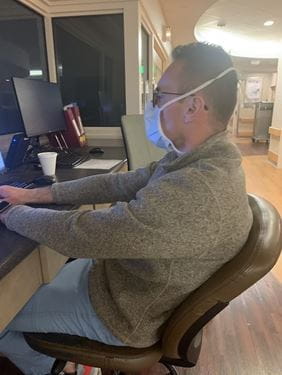 Every week requires assessing availability, shifting assignments and filling gaps.
Every week requires assessing availability, shifting assignments and filling gaps.
“It’s a lot of teamwork,” said Ruben Hernandez, MD, vice chair of education for the Department of Family Medicine. “It’s not only the residents who are on the front lines, but also in the backseat are all the administrative staff who review all the scheduling and have to call patients—it’s 100 people being ‘all hands on deck.’”
Redeployed residents are working nearly 80 hours a week in the hospital, where everything is in short supply—patient beds, professional staff, some medical supplies and often, patience.
“When COVID first started, you were a ‘healthcare hero’ and everybody had the attitude, ‘We’re in this together,’” McMillen recalled. As the pandemic enters its third year, the fatigue is showing. “Anymore, you’re giving everything you have, and somebody is just picking at you, complaining. You almost want to walk around with a big ‘sorry’ on your scrubs—everybody is working as hard as they possibly can.”
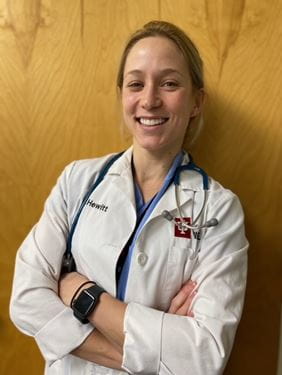 As administrative chief in charge of resident scheduling, Hewitt’s greatest frustration is seeing colleagues get COVID from caring for sick patients—many of whom are not vaccinated.
As administrative chief in charge of resident scheduling, Hewitt’s greatest frustration is seeing colleagues get COVID from caring for sick patients—many of whom are not vaccinated.
“I do get frustrated with patients who will want all available treatments—except the COVID vaccination,” she said.
Self-care and encouraging words from colleagues are important during this emotionally and physically demanding time. Hewitt recently purchased a Peloton stationary bike to help with stress relief through exercise.
“I think IU has done a good job in that they offer free support for residents; a lot of my colleagues are going for counseling,” Hewitt said. “We just try to stay positive and look out for each other if someone’s having an off day.”
There is an upside to doing residency training during a pandemic.
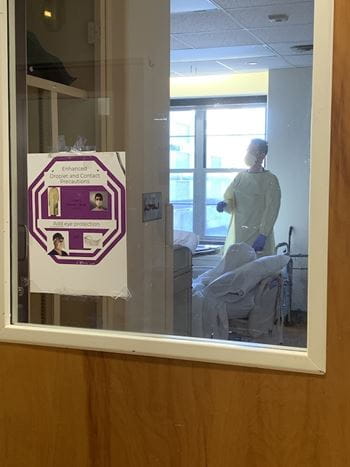 “Residents are developing flexibility and learning how public health works,” Hernandez said. “We have two years of good practice on how to manage patients virtually. Now we have residents and students who feel very competent in addressing patients virtually.”
“Residents are developing flexibility and learning how public health works,” Hernandez said. “We have two years of good practice on how to manage patients virtually. Now we have residents and students who feel very competent in addressing patients virtually.”
Hewitt and her colleagues have also gained experience in interprofessional teamwork and patient communication.
“Some of the good things that have come out of it, I’m very good at counseling my patients about vaccination as an outpatient provider, and I’ve learned a lot about working on a team and getting hospital-at-home services scheduled,” Hewitt said. “I feel more confident in my ability to have hard conversations and in counseling patients and advocating for primary care.”
After she graduates from the residency program in June, Hewitt will begin a sports medicine fellowship and is looking forward to the shift in focus.
“I went into medicine for a few reasons, primarily to help care for people and promote health and wellness in those of all ages, backgrounds and abilities,” she said. “Overall, I am very happy with my career choice and look forward to the future.”
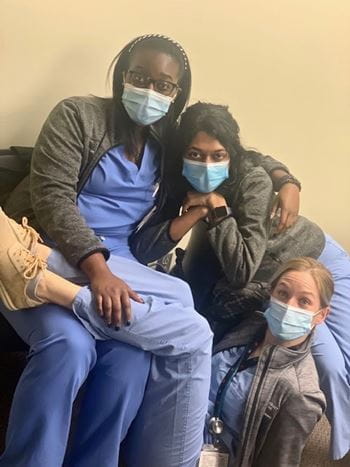 McMillen worries about physician burnout and is constantly checking in with his residents and colleagues. His plea to the public is, “Get vaccinated—help us out.”
McMillen worries about physician burnout and is constantly checking in with his residents and colleagues. His plea to the public is, “Get vaccinated—help us out.”
In his most recent newsletter to faculty, students, residents and fellows, Paul Wallach, MD, executive associate dean for educational affairs and institutional improvement, expressed gratitude for faculty and residents who are providing high caliber, compassionate care during the latest COVID surge, all of whom he said “exemplify the best in us in caring for those who are ill and in need.”
“I am extremely honored to be part of a respectful and collaborative physician community where the love of our mission is a force that no virus will defeat,” he wrote.
Hernandez urges all members of the IU School of Medicine community to support and encourage one another as the uncertainty of the pandemic’s course continues into 2022.
“Check on each other as humans,” he said. “We need to look after ourselves and each other, especially in this field where our work is to take care of many people.”
